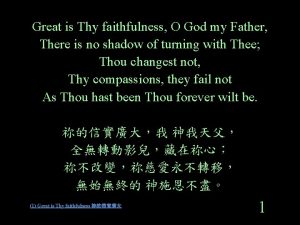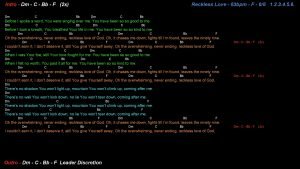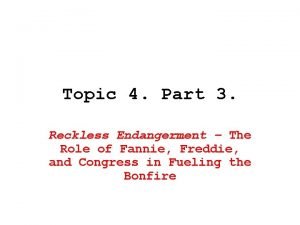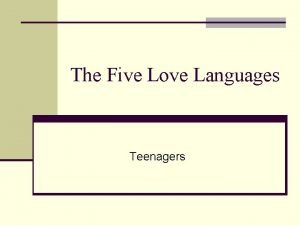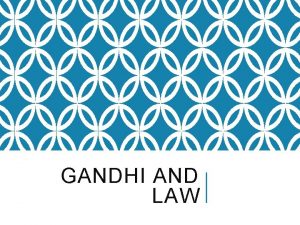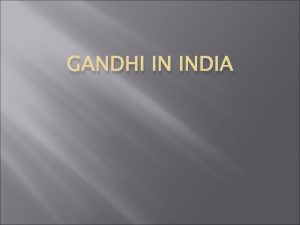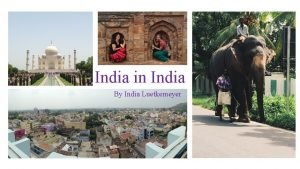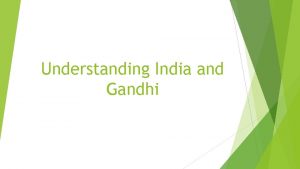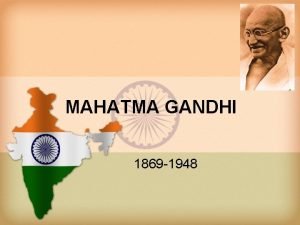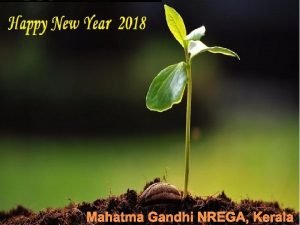Gandhi Reckless teenager to father of India Great




















- Slides: 20

Gandhi: Reckless teenager to father of India

Great Soul • Mohandas Karamchand Gandhi is known as Mahatma meaning ‘Great Soul’. He was an astute political campaigner who fought for Indian independence from British rule and for the rights of the Indian poor. • His example of non-violent protest is still revered throughout the world today. Find out how this man of peace and representative of India's poor came from a privileged background and spent his teenage years as a rebel.

1869 : Born to an elite family • Mohandas Karamchand Gandhi is born in north-west India in the princely state of Porbandar on 2 October 1869. • His family comes from an elite background. His father works for the government as the chief minister of Porbandar. His mother is a deeply pious woman who spends a lot of her time at temple and on frequent fasts. She instils in him a strong Hindu ethic, with an emphasis on vegetarianism, religious tolerance, a simple lifestyle, and nonviolence.

1883 : Teenage rebel • • « I felt deeply ashamed and miserable. I ran to my father's room. I saw that if animal passion had not blinded me, he would have died in my arms. » Gandhi’s father moves the family to the nearby city of Rajkot. Crucially schooling here is better and Gandhi is taught English. At the age of 13 Gandhi marries Kasturba, a local girl who is 14. Gandhi is a rebellious teenager – drinking, eating meat and womanising. Yet he is interested in selfimprovement and is repentant after each act of vice. When his father is on his death bed, Gandhi leaves to have sex with his wife and misses the moment of his death. When his wife becomes pregnant and the child dies shortly after birth, he sees this as divine retribution.

1888 : Studies law in London • Gandhi is unhappy at Bhavnagar College in Bombay and is offered the chance to study law at the Inner Temple in London. • The elders of his caste tell Gandhi he will be labelled an outcast if he travels abroad. He defies them and moves to London where he dresses in Western clothes. He finds kindred spirits in the vegetarian movement and at the Theosophical Society who help him to return to the traditional Hindu principles of his childhood: vegetarianism, no alcohol and sexual abstinence. Influenced by the society, Gandhi formulates his own ideas about the essential unity of all peoples and religions. « My young mind tried to unify the teaching of the Gita, The Light of Asia and the Sermon on the Mount. » Gandhi talks about the underlying unity of religions

1893 : Moves to South Africa • After graduating, Gandhi returns to India to practise as a lawyer. He loses his first case and is thrown out of the office of a British official. • Humiliated, Gandhi accepts a post in South Africa. When travelling the country he is ejected from a first-class train carriage because of his skin colour. Appalled at the treatment of Indian immigrants, he sets up the Indian Congress in Natal to fight segregation and to develop the idea of self-purification and “satyagraha”– non-violent civil protest. He takes a vow of celibacy and begins wearing what he calls his 'mourning robe', a traditional white Indian dhoti.

1914 : Wins a victory for Indian civil rights in South Africa • In 1913 Gandhi organises a strike against a £ 3 tax on people of Indian descent. • For the first time he is leading working -class Indians – agricultural labourers and miners. Building on his years of protest, Gandhi decides to lead a march of 2, 221 people from Natal into the Transvaal in his final act of public disobedience. Gandhi is arrested and sentenced to nine months imprisonment. But the strike spreads and the British are forced to drop the tax and release Gandhi. News of his victory is reported in England Gandhi starts to become an international figure.

1915 : Returns to India Gandhi makes a triumphant return to India. He decides he and his wife Kasturba should travel across the country in a third-class train carriage. Gandhi and his wife Kasturba , 1915. • Gandhi is shocked by the overcrowding and poverty he encounters and vows to work for the disenfranchised. He calls for a day of protest against the Rowlatt Act which enables the British to imprison anyone they suspect of terrorism. Hundreds of thousands gather in several cities but the protests turn violent. In Amritsar, General Dyer fires on 20, 000 protesters. About 400 people are killed and 1, 300 are wounded. This massacre convinces Gandhi to start campaigning for Indian independence.

1921 : Struggle for Indian independence • • With his popularity rising Gandhi becomes the main voice of the Indian National Congress and campaigns for political independence from Britain. Gandhi transforms the Indian National Congress from an elite group to a party of mass appeal. He wants a free India based on religious tolerance and acceptance of all faiths. Gandhi's calls for non-violent protests are embraced by Indians of all classes and religions. He encourages non co-operation with British rule, which includes a boycott of British goods. In response the British arrest Gandhi for sedition and he is imprisoned for two years.

Gandhi responds to a newspaper accusing him of hypocrisy « I wear the national dress because it is the most natural and the most becoming for an Indian » .

1930 : Salt March for freedom • Unable to ignore Gandhi’s work, the British plan a conference in London to discuss India’s future. They exclude all Indians from the talks. • Gandhi is furious and starts campaigning against Britain’s Salt Laws which outlaw Indians from collecting or selling salt and force them to pay for heavily taxed British salt. He leads thousands on a 'March to the Sea' where the protesters boil up salt water to make illegal salt – a symbolic act of defiance against British rule. He is arrested and the campaign escalates, with thousands refusing to pay their taxes and rents. The British give in and Gandhi travels to London to join the conference. It is alarming and also nauseating to see Mr Gandhi, a seditious Middle Temple lawyer, now posing as a fakir. Winston Churchill, 1930

The Salt March

Gandhi’s speech to the marchers (1930) • [On the 11 th of March 1930, the crowd swelled to 10, 000 at the evening prayer held on the Sabarmati sands at Ahmedabad. At the end, Gandhiji delivered a memorable speech on the eve of historic march: ] In all probability this will be my last speech to you. Even if the Government allow me to march tomorrow morning, this will be my last speech on the sacred banks of the Sabarmati. Possibly these may be the last words of my life here. I have already told you yesterday what I had to say. Today I shall confine myself to what you should do after my companions and I are arrested. The programme of the march to Jalalpur must be fulfilled as originally settled. The enlistment of the volunteers for this purpose should be confined to Gujarat only. From what I have been and heard during the last fortnight, I am inclined to believe that the stream of civil resisters will flow unbroken. But let there be not a semblance of breach of peace even after all of us have been arrested. We have resolved to utilize all our resources in the pursuit of an exclusively nonviolent struggle. Let no one commit a wrong in anger. This is my hope and prayer. I wish these words of mine reached every nook and corner of the land. My task shall be done if I perish and so do my comrades. It will then be for the Working Committee of the Congress to show you the way and it will be up to you to follow its lead. So long as I have reached Jalalpur, let nothing be done in contravention to the authority vested in me by the Congress. But once I am arrested, the whole responsibility shifts to the Congress. No one who believes in non-violence, as a creed, need, therefore, sit still. My compact with the Congress ends as soon as I am arrested. In that case volunteers. Wherever possible, civil disobedience of salt should be started. These laws can be violated in three ways. It is an offence to manufacture salt wherever there are facilities for doing so. The possession and sale of contraband salt, which includes natural salt or salt earth, is also an offence. The purchasers of such salt will be equally guilty. To carry away the natural salt deposits on the seashore is likewise violation of law. So is the hawking of such salt. In short, you may choose any one or all of these devices to break the salt monopoly. We are, however, not to be content with this alone. There is no ban by the Congress and wherever the local workers have self-confidence other suitable measures may be adopted. I stress only one condition, namely, let our pledge of truth and nonviolence as the only means for the attainment of Swaraj be faithfully kept. For the rest, every one has a free hand. But, than does not give a license to all and sundry to carry on their own responsibility. Wherever there are local leaders, their orders should be obeyed by the people. Where there are no leaders and only a handful of men have faith in the programme, they may do what they can, if they have enough self-confidence. They have a right, nay it is their duty, to do so. The history of the is full of instances of men who rose to leadership, by sheer force of self-confidence, bravery and tenacity. We too, if we sincerely aspire to Swaraj and are impatient to attain it, should have similar selfconfidence. Our ranks will swell and our hearts strengthen, as the number of our arrests by the Government increases. Much can be done in many other ways besides these. The Liquor and foreign cloth shops can be picketed. We can refuse to pay taxes if we have the requisite strength. The lawyers can give up practice. The public can boycott the law courts by refraining from litigation. Government servants can resign their posts. In the midst of the despair reigning all round people quake with fear of losing employment. Such men are unfit for Swaraj. But why this despair? The number of Government servants in the country does not exceed a few hundred thousands. What about the rest? Where are they to go? Even free India will not be able to accommodate a greater number of public servants. A Collector then will not need the number of servants, he has got today. He will be his own servant. Our starving millions can by no means afford this enormous expenditure. If, therefore, we are sensible enough, let us bid good-bye to Government employment, no matter if it is the post of a judge or a peon. Let all who are co-operating with the Government in one way or another, be it by paying taxes, keeping titles, or sending children to official schools, etc. withdraw their co-operation in all or as many watts as possible. Then there are women who can stand shoulder to shoulder with men in this struggle. You may take it as my will. It was the message that I desired to impart to you before starting on the march or for the jail. I wish that there should be no suspension or abandonment of the war that commences tomorrow morning or earlier, if I am arrested before that time. I shall eagerly await the news that ten batches are ready as soon as my batch is arrested. I believe there are men in India to complete the work our begun by me. I have faith in the righteousness of our cause and the purity of our weapons. And where the means are clean, there God is undoubtedly present with His blessings. And where these three combine, there defeat is an impossibility. A Satyagrahi, whether free or incarcerated, is ever victorious. He is vanquished only, when he forsakes truth and nonviolence and turns a deaf ear to the inner voice. If, therefore, there is such a thing as defeat for even a Satyagrahi, he alone is the cause of it. God bless you all and keep off all obstacles from the path in the struggle that begins tomorrow. • Mahatma, Vol. III (1952), pp. 28 -30 Source: Selected works of Mahatma Gandhi Volume-Six

1931 : A missed chance to define India’s future • Gandhi travels to London for the Round Table Conference as the sole representative of the Indian National Congress. • He presents a powerful image wearing his traditional Indian clothes. But the conference is a failure for Gandhi. The British are not ready to grant India independence and Muslim, Sikh and other delegates do not ally themselves to him as they don’t believe he speaks for all Indians. However Gandhi is granted an audience with King George V and visits mill workers in Lancashire. These public appearances gain him great publicity and some sympathy for the Indian nationalist cause in Britain.

1942 : Gandhi's "Quit India" campaign • After his failure at the conference, Gandhi chooses to step down as leader of the Indian National Congress and is side-lined from national politics. • When Churchill calls on India to support the fight against the Nazis, Gandhi is adamant it should not come to Britain’s aid while Indians are subjugated at home. He plans a non-violent protest demanding the British “Quit India” for good. In response he is imprisoned along with his wife, Kasturba. Violent protests calling for Gandhi’s release erupt across the country, but Winston Churchill is determined not to give in. Gandhi's wife dies in prison months before his release in 1944.

The "Quit India" movement • We shall either free India or die in the attempt; we shall not live to see the perpetuation of slavery. Gandhi speaks to Indian politician Nehru, 1942.

1947 : India gains its freedom • Unable to stop strengthening calls for freedom, the British finally begin negotiations for the independence of India. • However the outcome is far from what Gandhi has campaigned for. The Mountbatten Plan outlines the formation of the two new independent states of India and Pakistan, divided along religious lines. In the capital Delhi there are independence celebrations, but Gandhi’s vision of a united India is shattered. The Partition sets off mass mutual killings and the chaotic migration of 10 million people. Gandhi leaves Delhi, traveling to Calcutta to quell the violence by fasting to bring peace.

1947 : India gains its freedom The Partition of India was the partition of the British Indian Empire that led to the creation of the sovereign states of the Dominion of Pakistan (which later split into Pakistan and Bangladesh) and the Union of India (later Republic of India) on 15 August 1947. "Partition" here refers not only to the division of the Bengal province of British India into East Pakistan and West Bengal (India), and the similar partition of the Punjab Province into West Punjab (West Pakistan) and East Punjab (now Punjab), but also to the respective divisions of other assets, including the British Indian Army, the Indian Civil Service and other administrative services, the railways, and the central treasury.

The Partition of India creates more violence • Partition creates more violence. Gandhi returns to Delhi to help protect Muslims who have opted to stay in India and begins a fast for Muslim rights. • On his way to a prayer meeting at Birla House he is attacked by a Hindu extremist. He is shot three times in the chest. In some hard-line Hindu strongholds there are celebrations at his death, but for most Indians it is a national tragedy. A crowd of nearly one million people line the route of Gandhi's funeral procession to the banks of the Yamuna River. Across the world people unite to mourn the death of a global figure of peace, who never saw his dream of a united India become a reality.

1948 : The death of a great soul
 Great is thy faithfulness oh god my father
Great is thy faithfulness oh god my father Reckless
Reckless Internal containment, external containment, self-insulation
Internal containment, external containment, self-insulation Expired tags orc
Expired tags orc Gilded age eoc blitz review
Gilded age eoc blitz review Term used to describe extreme reckless charges
Term used to describe extreme reckless charges Reckless love bpm
Reckless love bpm Reckless trading
Reckless trading Reckless
Reckless Goal setting for teenagers
Goal setting for teenagers Salmon117
Salmon117 Love language touch
Love language touch Unhealthy lifestyle essay
Unhealthy lifestyle essay Teenager nn
Teenager nn Lack of understanding in relationship
Lack of understanding in relationship Effective communication with your teenager
Effective communication with your teenager Cite one example in your school or community of teenager
Cite one example in your school or community of teenager Wood wood teenager
Wood wood teenager Father of pediatric dentistry in india
Father of pediatric dentistry in india Write a brief note on national archives of india
Write a brief note on national archives of india Development of modern psychiatric nursing
Development of modern psychiatric nursing
